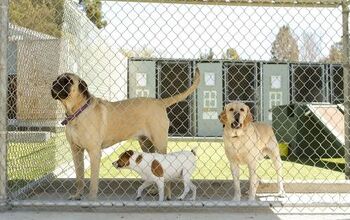Pros and Cons of Adopting an Adult Dog

Here, we’ll look at pros and cons of adopting a fully mature adult dog. (Considerations for puppies are outlined in a separate post.)
Pro: You know what you’re getting
Adult dogs are more “what you see is what you get” than puppies are. If you go to meet an adoptable adult dog at a foster home or shelter, his temperament, sociability, and activity levels are fully developed. (That said, a noisy, confined shelter can make many dogs anxious, shut down, or irritable. Bear the environment in mind.) If the dog has a behavior problem such as leash reactivity, you are likely to see signs of that during a meet-and-greet. Furthermore, you can easily know the dog’s size and have a better idea of his breed(s) just by looking at him.
Related: What Is A No-Kill Shelter?
Pro: Less time, less money, less energy
Adult dogs typically have fewer requirements. They can be left alone for longer periods of time than puppies, meaning fewer costs associated with dog walkers and sitters, and they likely have already had all their vaccinations and other medical needs taken care of. Some adult dogs come fully trained, but for those who don’t, you’re only looking at manners training and not puppy socialization classes. You will also have more free time than a puppy owner, as most adult dogs don’t require round-the-clock supervision and engagement.
Adult dogs, depending on age and other factors, have a more manageable energy level than puppies and adolescents. For families with young kids, an adult dog has already gone through his puppy play-biting stage, meaning he’s less likely to treat your child as a toy. (That said, not all adult dogs are suitable for families with kids. But the right adult dog can integrate into your family more smoothly than a typical puppy.)
Pro: Amazing adult dogs are often overlooked in shelters
Sympathy is not a good reason to adopt a dog. Above all, you want to make sure the dog you adopt fits your lifestyle. That said, puppies tend to get scooped up immediately, while many adult and senior dogs languish in shelters simply due to their age. If you are adopting a dog for compassionate reasons, the dogs most deserving of our compassion are the often-overlooked older ones. Think in terms of quality, not quantity; while you may have fewer years to spend with an adult rescue, the value of those years is immeasurable.
Related: 6 Fun Ways to Raise Money for Shelters
Con: Changing behavior may take time
As already mentioned, what you see is what you get. If you notice a concerning behavior in an adult dog, helping him overcome it might require time and effort. (I say “might’ because every dog’s situation is different.) Whereas puppies are considered more of a blank slate, adult dogs have already had years of life experiences, both good and bad. If you adopt a dog who displays fearful or aggressive tendencies, be prepared to work with a force-free trainer to find the most effective way to work through it.
Con: Less active
For adopters like me, the great thing about middle-aged adult dogs is that they usually have lower exercise requirements than puppies and adolescents. For some, though, this could be a negative. You can have dreams of jogging year-round with your dog or hitting the dog park every morning, but your adult dog might have other plans… like napping. As they mature, dogs tend to grow more selective when choosing their doggie friends, and become less tolerant of going for walks inclement weather.
The Verdict
Adopting any dog is an exciting, albeit nerve-racking, time. By choosing an adult dog that fits your lifestyle, you’re taking much of the uncertainty out of adopting and ensuring that you and your new dog will make a great team.

Kate Naito, CPDT-KA, is a dog trainer at Doggie Academy in Brooklyn, NY, and author of the training book, "BKLN Manners." She draws upon her experience as an educator and dog trainer to apply positive training techniques to a challenging urban environment. Kate is a rescue advocate drawn to special-needs dogs and currently has two Chihuahua mixes, Batman and Beans.
More by Kate Naito























